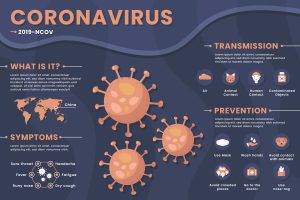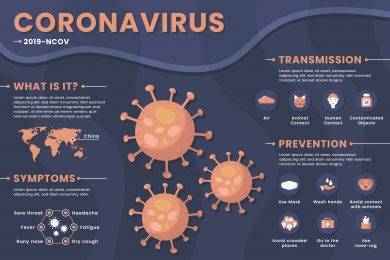Some answers provided by experts can help us answer some common questions from parents. Here is information about the new virus, the steps you have taken to prevent the continued spread of the new coronavirus, and how to protect yourself from the threat of infection.
What is a coronavirus? Coronaviruses are a collective name for a group of viruses that refer to viruses that can infect both humans and animals. They can cause respiratory diseases. Minor illnesses are like the common cold and severe illnesses can develop into pneumonia. Animal coronaviruses infect humans and spread among humans is extremely rare. The severe acute respiratory syndrome (SARS), which broke out in March 2002, is a typical case of coronavirus transmission from animals to humans. In 2012, another significant and recently emerging coronavirus strain, called MERS (Middle Eastern Respiratory Syndrome), emerged in the Middle East. Scientists said it was originally transferred from camel to human.
Should I be concerned if the test results show a “coronal virus” infection? Most coronavirus diagnoses are equivalent to having a common cold or flu. Remember that the term “coronavirus” covers the entire virus family. Coronavirus positive results do not require panic. However, if the test result is positive, please actively cooperate with the physician or the nursing team.

How is coronavirus transmitted? How to protect yourself? Coronaviruses are usually transmitted from person to person through coughing and sneezing, in close contact with infected persons, or on infected surfaces, followed by mouth, nose, or eyes. To prevent new coronavirus infections, the Centers for Disease Control and Prevention (CDC) recommends following basic hygiene habits, such as washing hands frequently, keeping your body hydrated, covering your nose and mouth with your hands or paper towels when coughing, and staying home when you are sick.
What are the symptoms of the new coronavirus? Coronavirus can produce a range of symptoms, including fever, cough, shortness of breath, sore throat, and runny nose. Most coronavirus infections cause only the common cold; more serious bacterial infections can cause severe pneumonia that requires hospitalization. The Centers for Disease Control and Prevention states that the symptoms of the new coronavirus include “symptoms of fever and lower respiratory illness (such as coughing, difficulty breathing).” Recent trips to certain areas with confirmed cases or contact with suspected virus carriers are at risk of infection.
Is coronavirus curable? There is no vaccine and antibiotics are not effective against the virus. Without any specific treatment plan, the medical staff usually treat the patient’s existing symptoms to make the patient feel comfortable.
How can one reduce coronavirus related anxiety? CBD products have been praised for their anxiety relieving benefits for years and a great choice to support mental and emotional health, naturally.
Have measures been taken to prevent the spread of the disease to Los Angeles? Los Angeles International Airport ( LAX ) is undergoing virus screening, but the new coronavirus has an incubation period of up to 14 days, so airport screeners cannot screen all potential patients.
Does CHLA screen new patients? Our medical staff follows all the latest guidelines from the Centers for Disease Control and Prevention in all contact with patients in an effort to prevent the spread of this new virus. We are actively screening all patients from an emergency or other hospitals as well as front desk and clinic staff to see if they have recently traveled internationally.
Are there any patient deaths? Coronavirus deaths are being monitored globally. The World Health Organization (WHO) claims that deaths are usually elderly, and 40% of them have a significant underlying disease, which is consistent with previous outbreaks of coronavirus.
What symptoms indicate a medical need? If you have traveled internationally within the past two weeks and have a fever, cough, or difficulty breathing, seek medical attention immediately. If you have recently traveled internationally, call your doctor or emergency room in advance to learn about your symptoms and tell them about the area you have been to recently. Ask your child to follow these guidelines as well. If your child has symptoms of coronavirus, please call and tell them before going to the emergency room.
Where can I get the latest information? With more new coronavirus information and facts disclosed, the situation may be constantly changing. For more information, visit the CDC website: www.cdc.gov.
Kat Irving is a reporter for Diving Daily. After graduating from NYU with a master degree in history, Kat got an internship at WABC-TV New York and worked on profiling local businesses. Kat was also was a columnist for the NPR. Kat mostly covers business and community events here at Diving Daily











